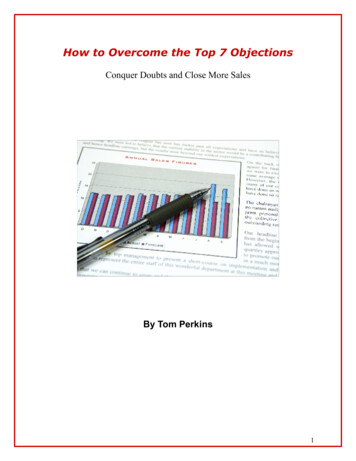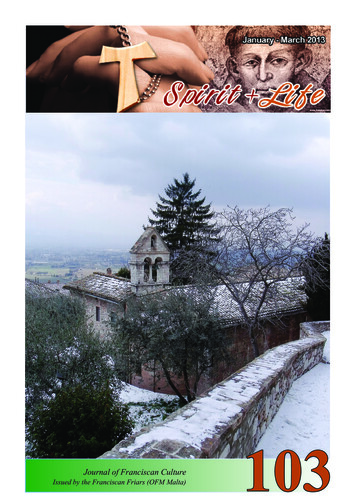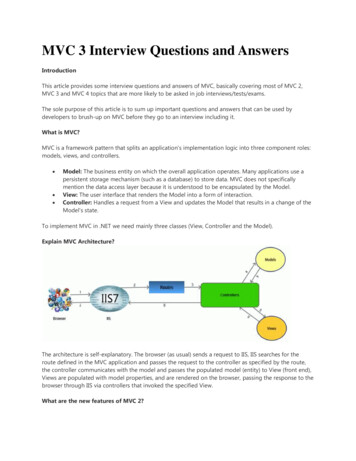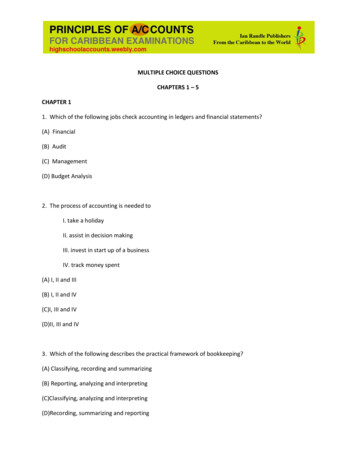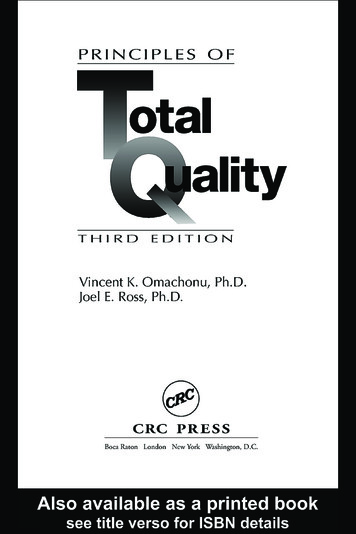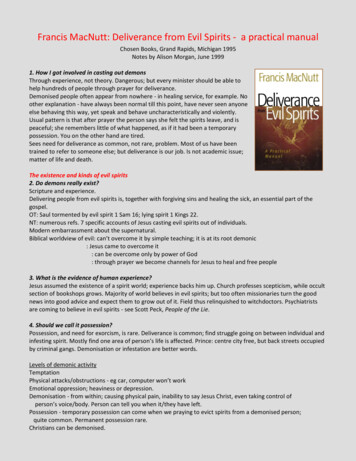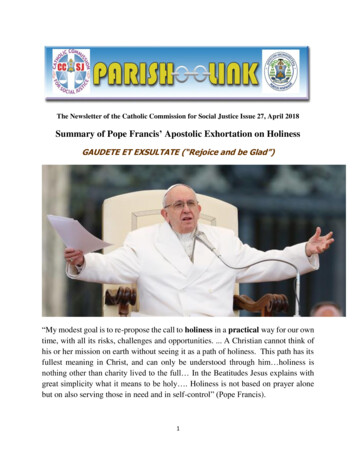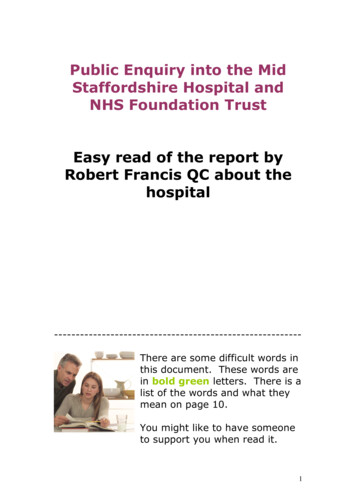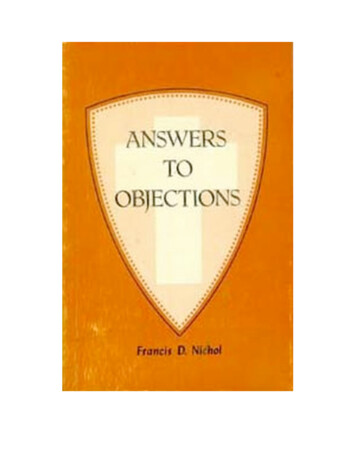
Transcription
Answers To ObjectionsByFrancis D. Nichol-An Examination of The Major Objections Raised Against The Teachings of Seventh-DayAdventistsDedicationTo That Valiant Company in the Advent Movement, Both Ministerial and Lay, Who Seek toPresent to Men the Truth of God With Convincing and Convicting Power, This Book is:Prayerfully Dedicated.ForewordByW. H. BransonIn bringing out a revised and enlarged edition of this work, the author has rendered a signalservice to the cause of God, further strengthening the hands of those whose lives are dedicated tothe proclamation and defense of' present truth.'The history of the Christian church is one of conflict. The enemy of truth and righteousness hasalways tried to minimize obedience to the commandments of God and to pervert the trueteachings of the Bible. Wherever the pure gospel has been preached, opposition has made itselffelt. The struggle has continued through the centuries in different forms. In these closing days oftime, when the dragon with increased fury is warring against the remnant who seek to uphold theintegrity of God's eternal law, there is need as never before that the champions of truth stand fastill defense of the faith. The Christian witness is called upon today to present a positive message,hewn out of the Word of God, a message that will stand in the evil day of satanic delusion andwill leave men and women established in the Christian verities.This volume gives a clear-cut, convincing answer to the objections most frequently raised bycritics of the doctrines held by the Seventh day Adventist Church. The objection is frankly setforth and the answer fully given in such a way as to win the confidence of the reader in theintegrity of the presentation. Sources of information and authority not ordinarily available to theminister engaged in general church work are brought forward to clarify the logic of thestatements made.Throughout their entire history Seventh day Adventists have stood for certain distinct doctrines,some of which differ rather sharply from the teaching of other Christian bodies. Because of ourinsistence upon the Scriptural authenticity of these unpopular teachings, we have naturally foundit frequently necessary to defend our positions against those who would by careless or faultyinterpretation seek to sweep away the distinctive tenets of our faith. Those pioneers of the churchwho laid so truly and well the foundation upon which we now build, were able to do so only byarduous study and fervent prayer. But their work has survived. Every assault has further
demonstrated the impregnability of our fundamental doctrinal positions. This does not mean,however, that we are now immune to attack or that we can safely ignore the criticisms of thepresent day. There is no discharge in the war we are called upon to wage in defense of the faith.With meekness and fear, and yet with an unalterable resolution, we are constantly to be readywith an answer for the hope within us, and so much the more as we "see the day approaching."With hearty approval, therefore, we commend this book to every gospel worker. It will prove aready helper in meeting both the attacks of the theological critic and the sincere questions of theperplexed inquirer. It will without doubt win honored acceptance as a valuable contribution tothe literature written in defense of the Holy Scriptures and the doctrines of the Advent faith.From the Author To the Reader of This BookIt is much more delightful to revel in the fragrance and beauty of the flowers in a garden than tobusy oneself removing cutworms from the plants. Few of us even wish to discuss suchunpleasant things, much less to deal with them. Why talk of them when we may talk of flowers?But unless we remove the cutworms we shall not long be able to enjoy the flowers.This simple illustration provides the reason for this book. It is written to meet false doctrine andthus to help ensure that the flowers of truth may continue to bloom and disseminate theirheavenly fragrance to the children of men.Perhaps some devout individual may reply that the illustration does not fit. He does not wish tothink that enemies lurk in the garden of God. At least he feels that God will care for His own, andthat the plants of the Lord, with their roots deep in the soil of eternal truth, can safely withstandall attacks. Therefore we should devote our time wholly to enjoying the flowers and to invitingthe wayfarer to enter the heavenly garden and enjoy them with us.The troubled history of the Christian church reveals the fallacy of such thinking. Even in theearliest, most divinely vigorous period of Christianity, the apostles felt it necessary to deal withthreatening doctrinal dangers. John, whose writings breathe the spirit of love, warned,-in hisepistles, against the deadly Docetic heresy then developing, that Christ was but an apparition.(See 1 John I:1-3; 4:2, 3) He also warned against the heretical idea that a Christian is beyond sin,and the equally heretical idea that we do not need to keep God's commandments. The personwho sets forth such a view, said John, "is a liar, and the truth is not in him." 1 John 2:4. Hediscusses the matter at length to prove why such teachings are false.Paul told the Corinthian church: "I determined not to know any thing among you, save JesusChrist, and him crucified." 1 Cor. 2:2. And some would use that isolated declaration to supportthe contention that the gospel minister should take no notice of false teachings or opposition.How unwarranted a conclusion can be drawn from a text when it is isolated from its wholecontext.Paul's epistles are generally tightly reasoned presentations of truth, with a negative as well as apositive aspect. Indeed he preached Christ crucified. But he realized that unless the deadly heresyof Jewish legalism was exposed and refuted, the preaching of Christ would profit nothing. That is
why his epistles deal so repeatedly and lengthily-with that heresy. Nor was it the only doctrinalerror that he exposed and refuted. Note, for example, his extended and militant argument againstthe false teaching that "there is no resurrection of the dead." 1 Cor. 15:12. One cannot read hiswritings without exclaiming: "If Paul was not God's lawyer, pray tell what was he?"Nor was this great apostle content simply to carry on militantly himself. He exhorted others to dolikewise. To Timothy he wrote:- Fight the good fight of faith.Hold fast the form of soundwords, which thou has heard of me." 1 Tim. 6:12; 2 Tim. 1: 13. To the elders of the church atEphesus he told of the "grievous wolves" that would "enter in among" them, "not sparing theflock," and of those in their own midst who would "arise, speaking perverse things, to draw awaydisciples after them." Then he added immediately: "Therefore watch, and remember, that by thespace of three years I ceased not to warn every one night and day with tears." Acts 20:29-31.When you "warn" you warn against. And this inevitably involves a negative action, justifiedhowever by its results, the protecting of the believer from false doctrine.Jude wrote: "Beloved, when I gave all diligence to write unto you of the common salvation, itwas needful for me to write unto you, and exhort you that you should earnestly contend for thefaith which was once delivered unto the saints." Jude 3. The whole of his brief letter warnsagainst and exposes "certain men" who had 11 crept in unawares" and were corrupting moralsand "denying" basic Christian doctrine.Peter warned the church of "false teachers among you, who privily shall bring in damnableheresies." 2 Peter 2: 1. Then he proceeds to devote most of his epistle to an examination andrefutation of those heresies.The written record of these resolute, militant men of God seems not to support the idea that weshould concentrate exclusively on enjoying the flowers, because forsooth the hardy plants oftruth need no protecting care from God's husbandmen.During the Reformation period its advocates had to do more than focus 6n the positive truth ofrighteousness by faith, and related doctrines. They had to deal with strong and speciousarguments brought forth by Rome's most subtle protagonists.In the Advent awakening of the early 1840's William Miller and his associates were notpermitted to deal exclusively with the glorious, positive truth of the personal soon coming ofChrist. They had to spend time refuting the plausible arguments of popular ministers who sought,among other things, to prove from Scripture that world conversion preceded Christ's Advent. Theliterature of the 1844 movement is filled with the vigorous, cogent reasoning of the Adventleaders as they exposed error and exalted truth.When the Seventh day Adventist movement developed, immediately afterward there began tocome from our press special tracts and pamphlets and books answering the claims of those whocontended that Sunday is taught in the Scriptures, that immortality of soul is the possession ofmen, that the law of God is abolished, and other false doctrines.
All this was inevitable. The presentation of any belief or doctrine, religious or otherwise, is intwo parts: setting forth evidence for the belief, and answering those who bring forth argumentsfor a contrary belief.Now, the initial period of militant advocacy of belief, and the refutation of false teachings, hasalmost always been followed by quieter times. A religious movement brought forth amidcontroversy and opposition discovers in time that it has secured a measure of standing amongmen. Then comes the temptation to stress less earnestly the distinctive truths that brought themovement into existence. It was this policy that caused early Christianity to merge withpaganism and various Protestant churches ultimately to lose their distinctiveness. Peace appealsas strongly to the warrior on the religious battlefield as it does to the literal soldier. The mistakethat the spiritual warrior makes is in thinking that in this world, so dominated by evil, he can everhope to conclude an honorable peace that will leave the kingdom of God safe from all futureattacks. There is no discharge in the warfare until God declares, "It is done."I am fully aware that the religious temper of the times is against emphasizing, much less fightingfor, distinctive beliefs. It is not supposed to be good taste. It delays the much-desired union of allchurches. Certainly if the churches wish above all else to unite, they must play down theirdifferences in theology. But by the same token, if a church wishes to maintain its identity and to.justify its separate existence, it must be ready to give a reason for the hope and the doctrines thatit holds, and this inevitably includes meeting the assaults of those who would seek to undermineits hope and its doctrines.There is one point above all others that distinguishes this Advent movement, the firm belief thatGod raised it up to preach a distinctive message, and to call on all men to join it in readiness forthe day of God. If we sincerely act upon this belief, we must be prepared to meet opposition, anopposition which we have prophetic reason to know will become more active and more bitter asthe end draws near. Let us never forget that our announced objective is the completing of thegreat sixteenth-century Protestant Reformation. That Reformation owes its very name to themilitant protest made against false teachings though, of course, Protestantism stands for a greatbody of positive truths. We belie the great name Protestant when we no longer are concerned toprotest that which is opposed to truth.As members of tile Advent movement we should be forever warned of the danger of buyingpeace with the currency of compromise as we note what has happened to most of Protestantismtoday. At the opening of the twentieth century a great number of the Christian ministry were stillfirm believers in the historic doctrines of Christianity, beginning with the doctrine of creation,But an active, persuasive, and well-educated group of clergy were presenting the case forevolution and related rationalistic ideas. It was evident that their theories were opposed to thelong-established doctrines of Christianity. And how did they seek to pierce this defensivedoctrinal wall? By the simple expedient of minimizing the importance of doctrine and affirmingthat Christianity is really a matter of the spirit, a beautiful fellowship with God as our Father andwith all men as brothers, and that everything else is incidental. Hence, if science has greatdiscoveries for us, let us make the doctrines fit tile discoveries. Which is another way of saying,Let us abandon the doctrines.
And that is precisely what has happened in most churches. True, there was a fierce war waged fora time, coming to something of a climax in the 1920's. After that the majority of church leaderswho had fought for orthodoxy gradually gave up, their will to fight having been sapped by thehighly promoted notion that peace and harmony are more important than any doctrine. And sotoday most preachers discourse on the love of God, idealistic living, right attitudes of mind, thebrotherhood of man, and the like. The great Bible doctrines of creation, sin, and salvation, andother cardinal tenets that have ever constituted the framework of the Christian edifice-these arenow rarely heard in Modernist churches, which constitute the great majority of churches.But the day that the Advent movement fails to put emphasis on doctrine, that day we have lostthe justification for our existence. We have a definite doctrine to present on the Second Advent,else we lose the goal and the objective that should be ours. We have a definite doctrine to preachon creation, else we remove the foundation for the Sabbath. We have a definite doctrine to preachon sin and salvation, else we make meaningless our teaching on the sanctuary. We have a definitedoctrine to preach on the nature of man, else we take all point out of our preaching on theresurrection and life only in Christ and our warning against the final delusions of spiritism. Andthus we might go on enumerating. If ever there was a movement built on clear-cut beliefs, beliefsinterlocked like the girders of a building, it is the Advent movement. We minimize these beliefsonly at the peril of destroying the building. On the other hand, if we put emphasis on thesebeliefs, we must be prepared to meet opposition and contrary views.However, someone may still inquire incredulously: Ought we not to follow Nehemiah's examplein regard to the adversaries of truth? "I am doing a great work, so that 1 cannot come down."Neh. 6:3. 1 subscribe to Nehemiah's words. It is easy to fall into unnecessary controversy.Certainly we ought always to keep on building the walls of Jerusalem rather than go down intothe valley to hold a conference with Sanballat and Tobiah.But Nehemiah is the last man of God in all the Bible who ought to be quoted in behalf ofinaction, where the adversaries of the Lord are concerned. When Sanballat and Tobiah sent theirthreats against the wall-builders Nehemiah kept his men working, to be sure, but only half ofthem, and they with only one hand, for "the other hand held a weapon." The remainder of hismen he armed with swords and spears and instructed them to guard the walls with their lives.Certainly the walls would not have been constructed if men had not continued to labor. But withequal certainty we may say that those walls might never have been built if there had not beenmilitant men with flashing swords and spears guarding the laborers. It was the gleam of theswords on the ramparts that gave heart to the builders. (See Neh. 4:16-18) Unquestionably, weshould never go down into the valley seeking controversy, but when adversaries attack thecitadel of truth on which this Advent movement stands, we should, in the name of the Lord Godof hosts, be prepared to defend that citadel. To provide arms for the defense is the purpose of thisbook.And now, lest this all sound too militant, let me quickly add that there are different ways to fightfor the faith. We need to make certain that we fight the good fight in harmony with the principlesof heaven. Only thus will we bring strength to the Advent movement and glory to God's name. Afew primary rules, if followed carefully, will enable the soldier of Christ to conform to those
principles. These rules apply to a discussion on the public platform, through the press, in theparlor, or over the back fence.1. Impute good faith and sincerity to the one with whom you are disputing. Sincerity may bepossessed even by one who sets forth the most preposterous opinion.2. Keep calm. If you cannot fight for the faith without displaying a rise of temperature, do notfight. Stay by the stuff, and let others of more equable disposition, or those who have gained thevictory over anger, carry on the active warfare for the faith.3. Be very sparing of strong language. There are doubtless times when such language may be inorder, but those occasions, I believe, are rare. 'We are not often called to stand, like Elijah, onMount Carmel. Because we are sure in our hearts that the truth and the evidence are on our sidewe can well afford to be not only calm and cool but kind in our language. The spectators, if therebe any, will measure our argument, at least in part, by our form of speech, even if the one withwhom we are differing does not.4. Reveal a spirit of great seriousness. Let it be evident that )our contending for your religiousviews is not to satisfy a desire for wrangling or controversy, but is prompted by a solemnconviction that the beliefs you hold are of most serious importance.5. Appeal to the heart as well as to the head. It is one thing to convince a man; it is another thingto convict him, and create in his soul a desire to obey the truths you have set forth. It is notsimply a question of what to say, but how to say it, if you would bring conviction. As thediscussion progresses seek increasingly to lift it above the level of a mere question of facts andevidence to the plane of the relation that the facts beat to the hearer's heart and eternal destiny. Ifwe are really to help a man, we must do more than close his mouth; we must open his heart toreceive the truth we have so earnestly been endeavoring to prove.Now a word concerning the history of this book. It was first published in 1932, and contained251 pages. In 1947 a portion of the book, then out of print, with considerable new matter, waspublished under the title Reasons for Our Faith. Some material from this latter book, now alsoout of print, with certain additional matter from the 1932 volume, plus new matter, has beencombined to make this present volume. Probably more than half of the contents is material neverbefore published in book form. Part 1 deals exclusively with specific objections to Adventistteachings. Part 11 provides certain added material in answer to various charges and more fullysets forth the evidence in behalf of certain doctrines.In most instances the objections considered have come to me through the years in letters fromout. ministers and lay workers who have stated that these were objections they frequently met.Sometimes these workers have sent in marked copies of anti-Adventist leaflets and booklets,which, they explain, have been widely circulated in the area where they are holding anevangelistic meeting. Sometimes the exact words of such printed matter are used in this book.Quotation marks indicate such use. Thus the objections considered are not academic, butpractical. In answering them I have attempted to avoid the barren procedure of dealing merelywith the negative; rather, 1 have endeavored to present the positive Bible truth on each question.
This book is sent forth with a desire, not to create needless dispute, but to aid you as you seek tocarry out the Scriptural injunction to "earnestly contend for the faith which was delivered untothe saints."Washington, D.C., August, 1952.
Section 1. Law--- --Objection 1Adventists quote much from the Old Testament in proof of their doctrines, particularly the law andthe Sabbath. Christians find their guidance and doctrines in the New Testament.We do quote much from the Old Testament. We also quote much from the New. Actually wemake no distinction in authority between the Old and the New Testament, and for the very reasonthat we, are Christians. We believe that the whole Bible, from Genesis to Revelation, is inspiredof God and thus rightly the guide for our lives.Some people, when they discuss the law and the Sabbath, seek to set up a contrast or evenconflict between the Old and the New Testament, as though the former were of little or no valueand quite superseded by the latter. This false contrast lies at the root of much of the erroneousreasoning that marks the arguments of those who contend that the law and the Sabbath wereabolished at the cross.The "Bible" of the apostles was what is now known as the Old Testament. The first writings ofthese earliest Christian ministers did not begin to come from their pens until twenty, thirty, andmore years after the ascension of Christ. Nor were there printing presses and fast-mail servicequickly to distribute these writings. Only slowly did they gain circulation. It is wholly reasonableto believe that during the first century of the Christian Era the term the Scriptures, mentionedrepeatedly in the New Testament, was largely understood to mean what we call the OldTestament.Christ admonished the Jews to "search the scriptures; for in them you think you have eternal life:and they are they which testify of me." John 5:39. And then He added, "Had you believed Moses,you would have believed me: for he wrote of me. But if you believe not his writings, how shallyou believe my words?" Verses 46,47The reason the disciples did not understand the events of crucifixion week was that they did notrightly understand the Scriptures, the Old Testament. (See Luke 24:27) On His resurrection dayHe showed them how His death and resurrection were a fulfillment of prophecy: "Then openedhe their understanding, that they might understand the scriptures." Luke 24:45. Christ knewnothing of the doctrine of discounting the Old Testament.Nor did the apostles give any hint that they discounted the Old Testament in favor of somewritings they were soon to produce. Paul wrote to Timothy: 'From a child thou has known theholy scriptures, which are able to make thee wise unto salvation through faith which is in ChristJesus. All scripture is given by inspiration of God, and is profitable for doctrine, for reproof, forcorrection, for instruction in righteousness: that the man of God may be perfect, thoroughly
furnished unto all good works." 2 Tim. 3:15-17. Could the New Testament accomplish more thanthis!Both Christ and the apostles repeatedly cited the 0ld Testament in confirmation of theirteachings. To Satan, Christ said, "It is written," and thrice quoted the Old Testament. (See Matt.4:4-10) He chided the scribes and Pharisees by quoting the fifth commandment, from the book ofExodus, and by quoting the words of Isaiah. (See Matt. 15:1-9) See also Christ's conversationwith the rich young ruler and with the lawyer. (Matt. 19: 16-19; Luke 10:25-28) Prominent inthese references to the 0ld Testament are the quotations from the Ten Commandments.How did Paul prove that all men, Jews and Gentiles, were guilty before God and thus in need ofthe salvation offered through Christ? By quoting from the Old Testament. (See Rom. 3:9-I8.)And how did he know that he himself was a sinner before God and in need of the gospel? Bycalling to mind what was written in the Old Testament, specifically what was written in the TenCommandments. (See Rom. 7:7) To the church at Rome Paul commanded: "Owe no man anything, but to love one another: for he that loves another hath fulfilled the law." Rom. 13:8. Anddid he profess to be setting forth a new code, which was the result of a new revelation then givento him? No, he quotes the Old Testament, and specifically the Ten Commandments. (See verses9, 10) And how did Paul support his appeal to children to obey their parents? By quoting fromthe Old Testament, specifically the Ten Commandments. (See Eph. 6:1-3.)As James develops his argument against having "respect to persons," does he set forth new laws?No, he quotes the Old Testament, focusing on citations from the Ten Commandments. (SeeJames 2:8-12)And what proof did Peter offer in support of his declaration that we should be "holy"? "Becauseit is written, Be you holy; for 1 am holy." 1 Peter 1: 16. His proof is a quotation from Leviticus11:44.The Scriptures, from Genesis to Revelation, are one whole. The source of the Old and the NewTestament is the same: the inspiration of the Spirit of God. Their objective is the same: to unfoldthe plan of God, to reveal Christ, to warn against sin, and to present God's holy standard of right.Someone long ago well observed: The New Testament is concealed in the Old, the OldTestament is revealed in the New. We can best understand the promise in the last book of theBible, of a re-created, a new, earth and a verdant tree of life, when we turn to the first book of theBible that describes. the good earth, with its original tree of life, that came forth from God's handwhen He first created this world. We best grasp the meaning of the cross, and Christ's words, "I,if I be lifted up from the earth, will draw all men unto me," when we read the Genesis account ofman's fall.We should never forget that the very titles "Old Testament" and "New Testament" are man-madetitles. Bible writers do not thus divide the ' Scriptures. Both Testaments deal with old and new inthe drama of sin and salvation. The Old Testament presents the promise of a new earth and a newcovenant, as well as picturing man's iniquities from earliest days. The New Testament discussesat length the "old man" of sin and the ancient problem of man's rebellion, as well as describingthe "new man" in Christ Jesus and the glories of a world to come.
The interrelationship of Old Testament to New, the dependence of one on the other, has everbeen understood by our adversary the devil. That is why he long ago began his attacks on theBible by seeking to undermine the historicity and authenticity of the Old Testament. It was at thispoint that higher criticism of the Bible began. And with the Old destroyed, the New sooncollapses for lack of historical foundation and meaning. It is understandable that Modernistsshould be found minimizing the spiritual authority and significance of the Old Testament. Butwhat is inexplicable is the attitude of some who consider themselves Fundamentalists of theFundamentalists in regard to the Old Testament. Why should they seek to tear in two theseamless garment of Scripture? Why should they set forth the doctrine that a holy command ofGod in the Old Testament must wait for restatement in the New before it has authority in theChristian Era, when the record is clear that the New Testament writers quoted from the Old, notto inform their readers that I lie particular passage from the Old was still binding, but to providecorroborative proof that their newly uttered New Testament declarations agreed with the Old andthus were also binding. In other words, the apostles, who reminded their readers that the "holymen of God" in "old time" "spoke as they were moved by the Holy Ghost," wished those readersto see that they, the apostles, spoke by the same Holy Ghost. (2 Peter 1:21) Hence theyrepeatedly cited in support of their admonitions and doctrinal reasoning the words of those "holymen" who wrote the 0ld Testament.It is true that a ceremonial ritual described in the 0ld Testament expired, by limitation, at thecross, for then the shadow met reality. And the New Testament writers specifically state thatthose rites, as set forth in a series of ceremonial laws, had come to an end. But that fact in no waymakes the 0ld Testament inferior to the New or justifies the contention that the New supplantsthe 0ld.--- --Objection 2Adventists seek to prove that there are two laws described in the Bible, one moral, the otherceremonial. But there is only one law.The logic of the objection is this: There is but one law; the Bible speaks clearly of a lawabolished; therefore, the Ten Commandments were abolished, including, necessarily, the fourth,on which Adventists build their case for the Sabbath.So much false reasoning has been reared on this one-law doctrine that it must be considered atlength.The word "law" is used in the Bible in a number of ways. In the phrase, "the law and theprophets," the word "law" rather uniformly means the books of Moses, because in his writingsthe laws of God are specially set forth. The word "law" is sometimes used without reference toany particular code, as a collective term to describe any and all laws. Again, the word "law" isoften employed to designate a particular code, for example, the moral law, or the ceremonial law,as we shall seek to show.
To contend that every time the Bible uses the word "law" it means the same code would be asreasonable as to contend that every time the Bible uses the word "day" it means the same periodof time. The facts are that "day" may mean (1) the light part of the twenty-four-hour cycle, as dayin contrast with night, or (2) the whole twenty-four-hour period, as seven days in a week, or (3)an indefinite period of time, as “now is the day of salvation." What would we think of the manwho reasoned that because certain texts in the Bible speak of the ending of the day, therefore theday of salvation has necessarily ended?The Bible does say that "the law-was-abolished-by Christ. (See Eph. 2:15) But Paul, who wrotethat statement, also declares: "Do we, then, make void the law through faith? God forbid: yea,we establish the law." Rom. 3:31. The contrast between the stat
Answers To Objections By Francis D. Nichol-An Examination of The Major Objections Raised Against The Teachings of Seventh-Day Adventists- Dedication To That Valiant Company in t

